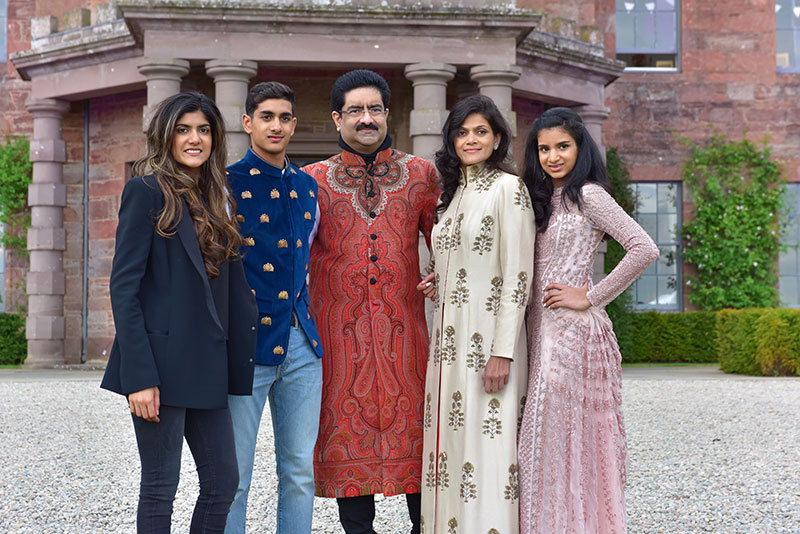“There’s a fine line between being a friend and parent”
In an interview with Dipta Joshi, Neerja Birla, chairperson of the Aditya Birla Education Trust, discusses the critical importance of shedding stigma about mental health issues and her struggle to balance home and work duties
 Neerja Birla is the hands-on chairperson of the Aditya Birla Education Trust which runs the Aditya Birla World Academy and The Aditya Birla Integrated School and is also the founder of Mpower Centre, a Mumbai-based mental health diagnostic and treatment centre, and Mpower Foundation, a mental healthcare initiative. Married to Kumar Mangalam Birla, chairman of the heavyweight, transnational Aditya Birla Group of companies (annual revenue: Rs.323,390 crore), and mother of Ananya (23), Aryaman (21) and Advaitesha (14), Neerja discusses the critical importance of shedding social stigma about mental health issues and her struggle to balance work and home duties.
Neerja Birla is the hands-on chairperson of the Aditya Birla Education Trust which runs the Aditya Birla World Academy and The Aditya Birla Integrated School and is also the founder of Mpower Centre, a Mumbai-based mental health diagnostic and treatment centre, and Mpower Foundation, a mental healthcare initiative. Married to Kumar Mangalam Birla, chairman of the heavyweight, transnational Aditya Birla Group of companies (annual revenue: Rs.323,390 crore), and mother of Ananya (23), Aryaman (21) and Advaitesha (14), Neerja discusses the critical importance of shedding social stigma about mental health issues and her struggle to balance work and home duties.
What is your parenting philosophy?
In my life as a parent I have learnt that actions speak louder than words. Mothers should model the behaviour they want their children to imitate and emulate. Moreover, if you expect respect from your children, you need to respect them as well. For this it’s also important to keep the channels of communication open. Today, children face far more complex situations and challenges than we did. Though exposure to new technologies and innovations makes them smarter, it also has its pain points. Unless children feel safe and confident enough to share everything with parents without fear of being judged, we won’t know what our children are really thinking or feeling.
Between your duties as chairperson of the Aditya Birla Education Trust and Mpower, how do you balance home and work?
Frankly, it’s a struggle to strike the right balance and at times I am torn between managing home, the schools and mental health centre. On days when I can’t manage it at all, I step back to realign myself. Women naturally want to be perfect in every role we play — the best mum, wife, daughter-in-law, daughter and also excel at work. All this takes a toll which is why we need to often step back and reflect. One has to accept the fact that it’s impossible to meet your expectations at all times.
As a mother, I often experience guilt. For instance, I feel guilty when I delay taking my daughter for her health check-up even though there’s good reason for the delay. To mitigate guilt I need to rationalise the circumstances. Rationalising the situation and its outcome has helped me strike a balance. I am a classic Type ‘A’ personality, always impatient and wants things done ‘yesterday’. However, it was my youngest daughter who pointed out that while packing in as much as possible into every day comes naturally to me, it causes stress and strain. Inadvertently, I was also putting pressure on my youngest child to pack her day with activities.
What kind of education do you value?
Our education system needs to make a paradigm shift from rote learning and right and wrong answers to developing critical thinking and reasoning skills. Schools need to teach students how to think rather than what to think. They also need to focus on promoting the emotional well-being of children, which is critical for healthy overall development.
India is facing a child mental health crisis. But within the parents and educators communities there is a strange reluctance to discuss and address mental health issues.
Unfortunately a multiplying number of children are suffering anxiety and panic disorders. The prognosis of an illness is always better if diagnosed in the early stages. Therefore if parents start a dialogue about mental health with children in early age it will encourage open conversations at home.
Unfortunately, there’s still significant social stigma associated with mental illness. Parents are ashamed and embarrassed to admit a family member has mental health problems. I personally know of children who are suffering mental health issues and want to consult a therapist but their parents are just not open to it. They feel it will tide over. They believe taking the child out of town, shopping or on a holiday will resolve the issue. Like physical illness — mental illness needs treatment — therapy and medication or a combination of both. Not addressing the issue is like expecting a child’s pneumonia to cure itself. Through our work at Mpower, we are raising public awareness about the need to shed social stigma about mental health issues.
What can parents do to help raise socially and emotionally well-adjusted children?
They need to be observant and vigilant of their children’s behaviour and immediately address emotional and psychological problems. For instance if a child is constantly fatigued or is uninterested in activities which earlier excited her, these problems need investigation. Classic symptoms of depression include a child not sleeping well, not wanting to step out of the house, becoming anti-social, and being irritable and moody. Children need attention, guidance and nurturing during the early years and particularly during the tumultuous teen years.
However, parents should resist the temptation to blame themselves for their children’s mental problems and illnesses. This feeling of guilt is what keeps parents from acknowledging that their children have a mental health problem. Understanding it’s not our failing is the first step to accepting that a child requires professional help.
Do you believe that children’s addiction to social media and gadgets is also a major contributor to childhood depression?
Excessive attachment to social media and gadgets is as an addiction but I am not so sure that is the sole cause of depression among children. Parents need to ensure that there is a balance in everything children do — be it browsing social media, playing online games or watching TV.
What is your final message to parents?
There is a fine line between being a friend and a parent. It’s important to keep walking this fine line. When children accept you as a friend, they will communicate freely which is important for family bonding. Yet parents also need to set rules and limits for the safety and good of their children.
Also read: Neerja Birla, Chairperson, Aditya Birla Education Trust, Mumbai















Add comment